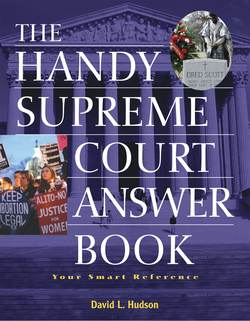Читать книгу The Handy Supreme Court Answer Book - David L Hudson - Страница 266
На сайте Литреса книга снята с продажи.
In what case did the Taney Court have to decide between two bridge-builders?
ОглавлениеThe Taney Court ruled 4–3 in Charles River Bridge v. Warren Bridge (1837) that the Massachusetts legislature could contract with the Warren Bridge Company to build a new bridge between Boston and Charlestown. The Warren Bridge businessmen convinced the legislature it would be a better deal for the public and the state, as they would not charge tolls after their construction costs were recovered. The problem was that years earlier the state legislature had granted a charter to the Charles River Bridge Company for the construction of the existing Charles River Bridge between the two cities. The Charles River Bridge officials did not want the construction of a new bridge to compete with them, as the tolls they had received over the years had proven quite profitable.
CourtSpeak: Charles River Bridge v. Warren Bridge Construction Case (1837)
Chief Justice Roger Taney (majority): “The object and the end of all government is, to promote the happiness and prosperity of the community by which it is established; and it can never be assumed, that the government intended to diminish its power of accomplishing the end for which it was created; and in a country like ours, free, active and enterprising, continually advancing in numbers and wealth, new channels of communication are daily found necessary both for travel and trade; and are essential to the comfort, convenience and prosperity of the people. A state ought never to be presumed to surrender this power.”
Justice Joseph Story (dissenting): “No man will hazard his capital in any enterprise, in which, if there be a loss, it must be borne exclusively by himself; and if there be success, he has not the slightest security of enjoying the rewards of that success, for a single moment. If the government means to invite its citizens to enlarge the public comforts and conveniences, to establish bridges, or turnpikes, or canals, or railroads, there must be some pledge, that the property will be safe; that the enjoyment will be co-extensive with the grant; and that success will not be the signal of a general combination to overthrow its rights and to take away its profits. The very agitation of a question of this sort is sufficient to alarm every stockholder in every public enterprise of this sort, throughout the whole country.”
The Charles River Bridge Company sued, seeking an injunction to prevent the building of a new bridge by the Warren Bridge Company. The Charles River Bridge Company argued that the state legislature violated the Contract Clause by impairing the original contract it had with the state. However, the Warren Bridge Company countered that the important public interests at stake trumped whatever private property rights Charles River Bridge had. The majority of the Court was concerned that if the monopoly was upheld, then improvements in transportation that would benefit the public at large could only take place at the whim of the private property owner.
The Taney Court ruled 4–3 in favor of the new bridge and the Warren Bridge Company. Chief Justice Taney reasoned that exclusive grants must be construed narrowly and must take into account the underlying public interests. “In charters of this description, no rights are taken from the public, or given to the corporation, beyond those which the words of the charter, by their natural and proper construction, purport to convey.”
